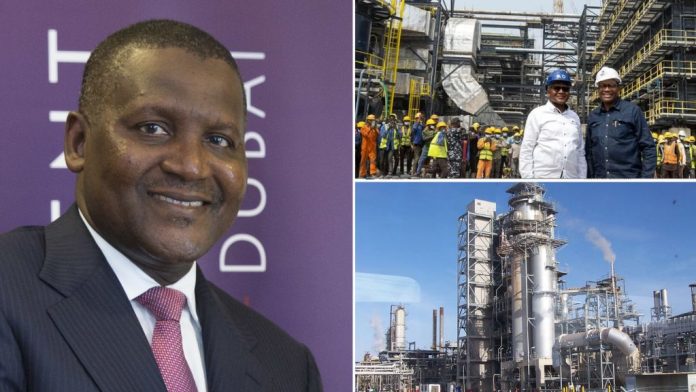HOPE FOR NATIONAL GROWTH THROUGH DANGOTE GROUP. By M K Ilyasu

HOPE FOR NATIONAL GROWTH THROUGH DANGOTE GROUP.

I have taken time to develop this narrative hoping it would assuage readers to understand events
that have led to some online narratives (cheche ku cheche) on Dangote refinery.

I cast a long view trying to tie some decisions to the future of oil and gas in Nigeria.
Please forgive my over indulgence on this matter which I believe deserve more than few paragraphs.
HOPE FOR WEALTH CREATION AND NATIONAL GROWTH.

The Nigerian economy relies heavily on the revenue derived from petroleum products, as they provide 70 percent of government revenue and about 95 percent of foreign exchange earnings.
With a processing capacity of 650, 000 bpd, the newly built Dangote refinery has now ranked seventh among world’s largest refineries
The oil and gas sector plays a significant role in the economy, contributing about 65% of government revenue and over 85% of total exports. Nigeria also has a largely underdeveloped mining sector, which makes up less than 1% of the country’s GDP.
By refining crude oil domestically, the Dangote refinery aims to generate wealth, enhance energy security, create jobs, and spur economic growth. The refinery, with a capacity to process 650,000 barrels per day (bpd), is the largest in Africa and among the largest in the world.
Critics argue that Dangote’s decision to build the refinery without securing an exploration licence for crude oil production may have been a strategic oversight. They further argued that if he had started drilling when he began building the refinery, he would now be producing enough to feed his refinery.
My perspective suggests that an integrated approach—combining production and refining—might have mitigated supply chain risks and ensured a more stable crude oil supply to the refinery. This would have put stop to those rumor mongers and negative speculators. In fact, it would have been non-starter at best.
At the project’s inception, Nigeria’s total crude output was said to be below two million barrels per day, with much of it committed to existing contracts and swaps with foreign refineries. This left the Dangote refinery dependent on imported crude, primarily from the United States, which nullified some of the logistical and cost-saving advantages of domestic refining.
POSITIVE CONTRIBUTIONS OF PETROLEUM TO NIGERIAN ECONOMY.
Here are some of the benefits Nigeria and Nigerians stand to gain from Dangote refinery.
1. Source of government revenue
2. Infrastructural development
3. Generation of employment
4. Source of foreign exchange. It is envisaged that the refinery would lead to the protection of forex revenue of around $16bn a year at current market prices and saving of $10bn a year through domestic supplies of petroleum products.
5. Source of energy. That the project would generate up to 12,000MW of electricity, enough to feed Lagos and two other states combined.
6. Improvement of standard of living. That the refinery would have an enormous impact on job creation by generating thousands of direct jobs and millions of indirect jobs, with over 135,000 permanent jobs for Nigerians.
As with Nigeria, Dangote refinery is a blessing since it has assisted in increased export and revenue generation which has been used for developmental purposes.
GOVT POLICY ON CRUDE SALE.
One significant policy issue is Nigeria’s allocation of crude oil for local refining. Unlike other oil-producing nations where refineries often operate independently of domestic crude production, Nigeria’s policy framework has not supported such a model. Not all refiners in other climes own oil mining licenses (OMLs). It is Nigeria, as a policy, that dedicate some percentage of its daily production to local feed and get paid in local currency, Naira.
Why did NNPC put our money in Dangote refinery where they can’t guarantee crude supply?
It is believed that Dangote refinery could eventually displace European refiners from the Nigerian market and secure a substantial share of the African market if supply chain risks are managed effectively. After all, non of the International Oil Companies operating in Nigeria ventured into setting up a refinery considering the number of decades spent operating in the country. We have since learnt to respect and encourage our initiatives.
Moreover, the refinery’s potential to produce premium motor spirit (PMS) and other refined products domestically could transform Nigeria’s energy landscape. The investment, if managed well, might offer dividends similar to those from the Nigeria LNG investment, which has consistently provided returns despite initial scepticism.
ENVIRONMENTAL RISKS.
The environmental impact assessment of the refinery cannot be overlooked. Concerns about pollution and the sustainability of such a massive industrial complex in Nigeria’s economic landscape are significant, especially as global trends move towards greener energy solutions.
Needless therefore, it becomes necessary to side with the much touted IRENE Report on renewable energy sources that predicted Dangote refinery to be adequate to meet Nigeria’s 47% of energy needs in 2030 and 57% by 2040.
Subsidy removal has catapulted price of fuel, gas, electricity as well as every other commodity that has direct and/pr indirect relationship with supply and demand chains. It is my belief that Dangote refinery will in time bring relief/succor to all Nigerians.
Indeed the health of our country’s ecosystems and the well being of our communities can not be overemphasised. Needless however, the refinery stands out as Nigeria’s greatest drive to self sufficiency on her energy needs and all necessary steps must be taken to avert any accident, in sha Allah.
DANGOTE OTHER BUSINESS OPERATIONS: Where they Stand.
You google the dangote.co, where you will find enough information on other Dangote projects in Nigeria including sugar, tomato, rice, cement, salt, flour, infrastructure and many more and the ongoing effort to bring them to fruition. I have no doubt that Nigerians stand to gain enormously by investing in any of those ventures initiated and run by Dangote Group.
CONCLUSION
As Agnes Ekeibuke would say, “the Dangote refinery stands as a testament to Nigeria’s industrial ambitions and the complex interplay of business strategy, economic policy, and national interest.
Well done Aliko Dangote, GCON.
11/08/2024




